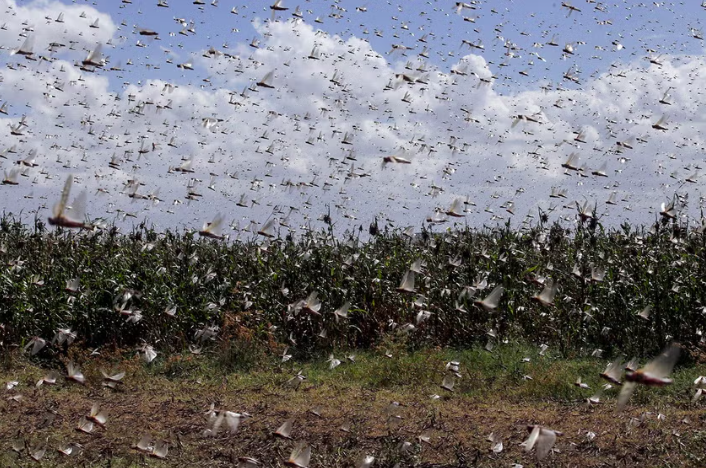A plague of hungry grasshoppers has destroyed nearly half of the outdoor cannabis crops in southern Colorado this fall.
There are over 100 species of grasshopper in Colorado, and these highly mobile bugs love to chow down on grasses, trees, and on occasion, cannabis plants. Weed farmers are generally able to keep these pests from causing too much trouble, but this year’s above-average rainfall has allowed an unprecedented number of grasshoppers to breed. And now that the swarm has devoured most of its standard food sources, they have turned their attention to the fibrous stems of cannabis plants.
“Grasshoppers are eating full branches,” said Nathaniel Eaton, co-owner of outdoor cultivation facility Stargazer Farms, to Westword. “We’ve lost about fifteen pounds, but there are entire farms being cleaned out.”
Humble Farms, a three-tiered cultivation facility in Crowley County, is one of those farms. In less than a week, hungry grasshoppers managed to ruin the farm’s entire outdoor cannabis crop. Fortunately, the farm grows most of its plants in an indoor greenhouse with electronic lighting, so the company will still have weed to sell this year. But its traditional annual harvest of outdoor bud is completely gone.
“They eat at the base of the plant,” co-owner Ben McIntosh told Westword. “We put 1,000 plants in the ground, and within a few days there were three left.”
The swarm of bugs swept through the entire country and visited pretty much every outdoor weed farm on their way. Crowley County cannabis business liaison Tobe Allubaugh estimates that around half of the county’s outdoor pot harvest was ruined by grasshoppers this year. That’s terrible news for farms that grow most of their weed in the open air, because outdoor cannabis grows can only be harvested once a year.
“I know a few growers that planted 1,800 plants and three days later they’re wiped out,” said Allubaugh to Westword. “It’s too late to replant, and they don’t have the money to wait until next year. They’re decimated. When I drove around a little earlier, at least ten or twelve grows from last year have crops that have died this year. But the good news is, for those whose plants are still alive, the price may go up a little.”
This summer’s wet weather has also brought a “biblical plague” of crop-devouring Mormon crickets in western Colorado and neighboring states. Farmers that grow traditional crops like wheat and alfalfa can protect themselves from bug-related disasters by taking out crop insurance policies, but weed farmers have no such luck. Most insurance companies refuse to offer plans to cannabis companies, and those few that do can charge over a million dollars to protect 2,000 plants.
Pesticides aren’t proving to be much of a solution, either, because Colorado’s safety regulations prohibit farmers from dousing their crops in toxic chemicals. Some farmers have considered employing security patrols of chickens and turkeys, which apparently love to snack on grasshoppers, to guard their plants. That solution may end up creating yet another problem, though.
“Chickens and their fecal matter have been directly linked to things like salmonella in the past, and the Division would recommend caution in introducing any animals that could potentially contaminate the cultivations,” explained Colorado Marijuana Enforcement Division spokesperson Daniel Carr to Westword.











